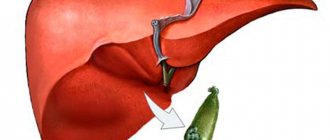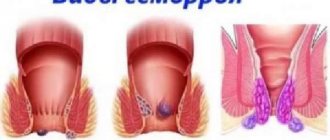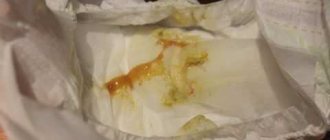Everything that comes out of the rectum (except stool) requires attention. It's mostly mucus or pus. You'll notice them on underwear, toilet paper, and sometimes in feces. Discharge from the rectum occurs in a number of severe intestinal diseases. Sometimes this is the first sign of a problem.
Starting treatment at this stage will stop the progression of the disease and provide significantly better results. Therefore, if you notice bowel discharge, be sure to consult a doctor.
And now - about diseases that should be suspected when discharge appears from the rectum.
Bloody discharge from the anus
The causes of this symptom are very diverse. The source can be localized in any part of the intestine.
Haemorrhoids
The most common cause of sanguineous fluid from the anus is hemorrhoids and anal fissures. According to various sources, the disease affects from 60 to 80% of the adult population. As a rule, the phenomenon is detected during defecation, when red streaks are visible in the stool and on toilet paper. The causes of anal pathology are:
- Frequent constipation.
- Passive lifestyle.
- Excess weight.
- Pregnancy.
- Varicose veins.
Cracks lead to minor discharge and are a consequence of damage to the anus due to the release of hard feces or injury during anal sex. When a hemorrhoid ruptures, the bleeding is significant and can lead to emergency hospitalization. In advanced cases, the bumps become ulcerated, which leads to prolonged, mild bleeding.
Symptoms of hemorrhoids:
- A node visible from the outside, or an internal sensation of a foreign body;
- Itching in the anal area;
- Pain during bowel movements;
- Tingling and burning;
- Bloody issues.
Carefully! If anal fissures and discharge are not treated, bacterial infection can occur, which is very dangerous.
Formations and tumors in the intestine
Rectal polyps are often injured during the passage of feces and due to peristalsis. This pathology leads to intestinal cancer if the problem is not addressed. The color saturation of the discharge depends on how high the formation is located. The closer to the anus, the brighter the blood. Duodenal polyps lead to dark, bloody discharge. In addition, such growths provoke mucus production.
Cancerous and benign intestinal tumors also become damaged and bleed. Oncology manifests itself with such symptoms already in the final stages.
Other causes of anal fluid
Worms, advanced inflammatory processes, and internal injuries to the intestines as a result of an impact also lead to bleeding. They are accompanied by various symptoms, which without tests do not show a clear clinical picture.
Discharge from anal abscess
An anal abscess is a purulent lesion localized in the anus. This is the result of an acute infection of the internal glands of the anus in nine out of ten cases. The internal glands of the anus produce fluid. When their ducts become blocked, fluid accumulates, becomes infected, and forms an abscess.
Anal abscess
An abscess can also form due to injury or a sexually transmitted infection. It is also possible that the root cause of the problem may be Crohn's disease or diverticulitis. The disease can affect people of both sexes at any age.
The risk increases with immunodeficiency, diabetes, inflammatory bowel disease, chemotherapy, and long-term use of steroids.
The discharge from an anal abscess is clearly purulent. Accompanied by throbbing pain, aggravated by defecation, coughing, and sitting. Possible constipation, increased body temperature, chills, night sweats, weakness, and increased fatigue. The area around the anus is red and painful.
The disease is diagnosed by rectal examination. During diagnosis, attention is paid to increased body temperature, redness and painful swelling in the anal area. Upon examination, a defect is discovered from which pus, blood or feces are released. Proctosigmoidoscopy or other tests may be performed to rule out other diseases.
The anal abscess itself rarely goes away. Also, antibiotics alone rarely help. Most cases require surgery.
Treatment of the pathology usually includes drainage of the abscess. This can be done on an outpatient basis under local anesthesia. The need for deeper anesthesia cannot be ruled out.
Immunocompromised persons at risk of developing severe infectious disease should be hospitalized.
Slime
As already mentioned, slippery fluid from the anus is caused by polyps, but there are other reasons for such discharge.
Errors in nutrition
This symptom is caused by the consumption of fatty foods and a small amount of fiber in the diet. Associated symptoms:
- Flatulence;
- Stomach ache;
- Constipation and diarrhea;
- Belching.
To relieve problems in the intestines, it is enough to introduce whole grain cereals, raw fruits and vegetables, as well as fermented milk products into your diet. Avoid baked goods, sweets, fried and fatty foods.
Attention! The quality of food largely determines the character of the stool. Constipation and diarrhea occur due to an unbalanced diet, rare and large portions, and poor quality foods.
Intestinal dysbiosis
The cause of mucous discharge from the anus can be a violation of the microflora. This happens after treatment with antibiotics, due to a general decrease in immunity, in autoimmune diseases. You can restore balance in the intestines by consuming fresh fermented milk products, suppositories and other preparations with live lactobacilli. During treatment, follow a diet with restrictions on fatty, flour, and spicy foods. Also prohibited are alcohol, carbonated drinks, and vegetables that cause flatulence - cabbage, turnips, radishes, and legumes.
Crohn's disease
Severe pathology of the gastrointestinal tract can manifest itself in any part of the digestive tract in the form of inflammation, cracks, scars and ulcers. When the intestines are damaged, it causes a false desire for big things, in which not feces come out of the anus, but yellow mucous discharge.
Sphincter insufficiency
A condition in which the opening cannot be completely closed outside of the process of emptying causes the appearance of mucus - the secretory fluid of the intestines. This happens after operations in this area and is solved surgically.
Other reasons
Worms, tumors, hemorrhoids, infections, inflammations, papillomas and condylomas also cause mucous discharge from the anus. A constant humid environment leads to skin irritation and cracks, which significantly aggravates the human condition.
Dysbacteriosis
White liquid usually indicates intestinal dysbiosis. Most often, this kind of discharge does not have any odor and may be accompanied by similar symptoms:
- abnormal stool, frequent constipation or diarrhea;
- flatulence and excessive bloating;
- unpleasant odor in the mouth;
- nausea and vomiting.
Most often, dysbiosis can be caused by intestinal poisoning, taking antibiotics, pathologies of the digestive system, and this problem can also arise as a result of low immunity and poor nutrition.
Long-term dysbacteriosis may lead to impaired absorption of nutrients and general depletion of the body.
VIDEO “FLUID WITH BLOOD FROM THE ANUS”
Curdled discharge
Thick white masses with a sour odor cover the stool and pass outside the bowel movement. This is a fungal infection caused by candida. Normally, the majority of the world's population has these microorganisms. As soon as the number of own lactobacilli decreases due to weakened immunity, fungi begin to multiply, literally eating into the mucous membranes. In the process of life, they poison the body, which causes something like an allergic reaction. With intestinal thrush, as the disease is popularly called, the following symptoms occur:
- Weeping anus;
- Severe itching;
- Grainy white discharge;
- Bloating;
- Pain not associated with eating.
In women, candidiasis often occurs in the vagina, especially during pregnancy. Without treatment, with insufficient hygiene and reduced immunity, the fungal infection spreads to the urethra and anus.
Treatment of intestinal thrush is carried out with antifungal drugs followed by restoration of normal microflora. The first group includes Duphaston, Pimafucin, Nystatin, Fluconazole and others. To the second, any drugs with live lactobacilli, for example, Acipol or Hilak Forte.
Attention! If a fungal infection has developed in the intestines, this means very serious failures in the immune defense.
Purulent discharge from the anus
Abundant yellow, green and even orange mucous masses with a strong, unpleasant odor are a sign of infection. They are accompanied by general malaise, fever and symptoms of poisoning.
The cause of inflammation can be any pathogenic microorganism - staphylococcus, salmonella and others. It happens that STD pathogens, for example, gonococcus or Trichomonas, enter the intestines. In women, the infection is transmitted from the vagina, or occurs in both sexes as a result of anal sex. The foamy structure of the liquid with the smell of rotten fish speaks in favor of these microbes.
Neoplasms
Most often, various types of neoplasms rarely have any symptoms, especially in the initial stages. Yellow or green liquid is practically the only sign. In some situations, ichor may be released. Such manifestations can also be caused by other intestinal diseases, and may be of an inflammatory, non-infectious nature. The late stages of colon cancer may be accompanied by the appearance of lumps of dark blood during bowel movements.
Watery clear discharge
This symptom accompanies IBS - irritable bowel syndrome. It is not yet clear what causes this condition. A person constantly has a feeling of fullness, he is tormented by gases, bloating distends his stomach so that it becomes difficult to breathe. In addition, diarrhea and constipation occur. However, no visible causes of the patient’s pathology are found.
It is necessary to follow a special diet, eat little and often, and avoid stress. To alleviate the condition, enzyme preparations help - Mezim or Creon, antispasmodics - No-shpa and Drotaverine, as well as sedatives - Glycine, tinctures of valerian or motherwort.
Attention! Copious watery discharge occurs from the anus in case of serious poisoning. The condition is dangerous and you must contact a medical facility.
Oily liquid
Oily discharge covers the stool and makes it shiny. A similar phenomenon occurs with digestive disorders, when fats are not absorbed in the intestines, as well as with the abuse of foods with a high content of fats. This symptom occurs when taking enzyme preparations - lipase inhibitors. These are Xenical, Listata, Orsoten, Xenalten, Orlistat. These drugs are used for obesity; they promote the removal of lipids without absorption, which leads to weight loss. Oily discharge from the anus also occurs when there is a malfunction of the gallbladder and liver, with enterocolitis, or when taking birth control pills.
Oily discharge
This kind of discharge may not always be a sign of pathology. They can occur as a result of eating fatty foods, oral contraceptives, or taking medications for weight loss.
In this case, the feces are usually quite difficult to wash off the toilet and become slightly shiny. With the regular appearance of oily mucus from the anus, doctors suspect inflammation and disease of the gallbladder or pancreas.
Important! This may also indicate an internal form of hemorrhoids or colitis.
The appearance of oily mucus requires therapy, one of the points of which is proper nutrition. If this type of discharge appears for a long time, it is necessary to visit a specialist and undergo a full examination of the internal organs.
Color
Different shades may indicate a specific pathology or direction in diagnosis.
White mucous discharge
The most obvious sign of a parasitic infection is milky inclusions in the stool. In addition, the following symptoms are observed:
- Bloating;
- Gases have an unpleasant strong aroma;
- The stomach often growls;
- Itchy anus;
- The lower part hurts in the form of spasms;
- Bad breath;
- Underweight;
- Dry and pale skin;
- Bruises around the eyes.
There are a lot of parasites, treatment is difficult and lengthy. Drugs that can kill worms also have a toxic effect on the human body. In order to destroy the hosts, Levamisole, Pyrantel, and Decaris are used.
Attention! The standard test for worm eggs is not very informative. For a reliable diagnosis it is necessary to donate blood.
Yellow discharge
This symptom occurs when the sphincter is insufficient, when a small amount of dissolved feces comes out of the anus with mucus. It can also be a sign of inflammation of the gallbladder, bacterial infection or proctitis.
Orange stripes on feces
This shade is obtained when blood combines with bile in the intestines, which indicates diseases of the liver and gall bladder. Along with this, there is pain in the right hypochondrium and a bitter taste in the mouth.
Liquid brown discharge
A similar sign in the presence of generally hard stool indicates inflammatory processes in the lower parts of the intestine, proctitis, as well as tumors.
Green discharge
As already mentioned, such a symptom indicates a bacterial infection. But these can be not only STD pathogens or opportunistic microbes, but also Helicobacter pylori, which provokes gastritis and gastric ulcers.
Black
Tarry stool, or dark clots from the anus, is bleeding in the upper digestive tract. Even the nasopharynx can be a source of discharge. It is impossible to determine the localization without a complete examination. Moreover, black feces occur when consuming iron supplements, activated carbon, and certain foods. The cause of this shade can be determined by analyzing stool.
Attention! Black discharge from the anus in the form of clots in large quantities indicates serious internal bleeding, which must be stopped immediately.
Proctitis
The appearance of fluid is usually observed at the acute stage of the pathology; they can also indicate an inflammatory process. The usual discharge is purulent in nature and can sometimes contain blood. The skin around the anus becomes irritated, becomes red, and itching and burning may occur.
Proctitis can signal itself with similar symptoms:
- increased body temperature;
- frequent urge to defecate, which may be false;
- discomfort, burning and itching in the rectal area;
- pain in the intestines of various types.
Mucous formations can have different intensities and colors. This directly depends on the bacteria that caused the inflammation. Usually, at the initial stage, the discharge is light in color, and over time it can acquire a yellowish tint.
Discharge from the anus in men
The sedentary lifestyle of office workers and drivers leads to hemorrhoids, as does lifting weights in the gym. Young gay people are more susceptible than others to infectious inflammation of the rectum and anal fissures. With prostatitis, the pathology spreads to the intestines. Men pay less attention to their diet and health in general. This may be why they have a higher risk of colon cancer than women.
Attention! Half of men over 50 years old have polyps in the rectum, which is a pre-cancerous condition.
Discharge from baby's anus
Newborns and young children often experience intestinal problems. Ask a young mother what kind of stool her baby has, and she will tell you in great detail. The fact is that it is with the gastrointestinal tract that troubles most often occur in infancy. Diarrhea, constipation, bloating, colic are familiar to every parent. Often mucous discharge appears from the anus, purulent due to the child’s natural desire to taste everything. A fragile body is attacked daily by millions of bacteria. Bloody diarrhea can be a symptom of lactate deficiency, when for some reason the baby is unable to digest milk. A dangerous condition is intestinal volvulus, which is manifested by blood clots and abdominal pain. In such a situation, hours and minutes are counting, and emergency medical care is needed.
Intestinal dysfunction, especially with bleeding, leads to weight loss and developmental inhibition. Often accompanied by general malaise, fever, and poor appetite. You can solve the problem by contacting a pediatrician and pediatric proctologist.
Intestinal pathologies in infancy can lead to death in a matter of hours. Even banal diarrhea without foreign secretions provokes dehydration on the verge of life and death. Digestive problems affect the development and growth of the child. During such a period, every healthy day provides years of normal life in the future.
Crohn's disease
Inflammation of the intestinal organs can have symptoms such as abdominal pain, chronic diarrhea, exhaustion, lack of vitamins, flatulence, severe bloating and even eye damage. As a result of Crohn's disease, serious complications may occur, including intestinal obstruction, peritonitis, fistula, and heavy bleeding from the anus.
In this case, the discharge may be purulent in nature and may contain streaks of blood. The number and intensity of the manifestation of mucous formations directly depends on the severity of the inflammatory process.
Diagnostics
When there is discharge from the anus, pathology is assumed in 100% of cases, because normally this should not happen. However, this problem is so diverse that even a specialist solves it by differentiation, gradually eliminating possible options. The necessary examinations include:
- Examination by a proctologist with palpation of the abdomen and rectum. Thus, hemorrhoids, tumors, polyps, and fissures in the anus are detected;
- Stool analysis. Detects infection, blood, quantitative and qualitative composition of the material. It is studied for dysbacteriosis, enzymes, a coprogram is made, bacterial culture
- Blood and urine will show the inflammatory process in the body;
- Biochemistry data will help identify problems with the pancreas, gall bladder, and liver;
- You can look into the intestines using a colonoscopy;
- Computed tomography or magnetic resonance imaging will allow us to assess the overall condition of the entire gastrointestinal tract for the presence of changes, tumors, and polyps;
- Sometimes an x-ray with contrast injection into the rectum is necessary;
- If suspicious formations are detected, a biopsy is performed.
What to do?
Despite the color shade and intensity of the discharge, it is imperative to visit a proctologist. The most dangerous to human health and life are discharges with blood and an unpleasant odor. They are usually infectious or inflammatory in nature.
If treatment is not timely, the infection can also spread to other parts of the intestine and the peritoneal area. The only exception is clear discharge, which occasionally appears in healthy people.
The bright color of discharge after defecation (yellow, orange or red) may indicate an acute inflammatory process in the body, as well as serious pathologies of internal organs. If foam is present in the secreted fluid, then most often this indicates an infection or inflammatory process in the body. Foamy mucus from the anus can occur as a result of sexually transmitted infections. Then, in addition to discharge, there may be general discomfort in the anus and genital area.
Also, bile can be observed in the mucus, which most often indicates damage to the liver and gallbladder. Of particular danger are discharges of a jelly-like consistency mixed with pus. The color of stool in liver pathologies may acquire a lighter color.
Before treating any pathology, it is necessary to visit a specialist and undergo a series of laboratory tests, as well as diagnostic procedures.
Diagnostics
To find out the main cause, make a diagnosis and prescribe therapy, you need to contact a coloproctologist. To establish the true causes of mucus discharge from the anus, palpation and examination of the anamnesis are not enough. It is necessary to conduct an instrumental examination of the intestines, take a general analysis of stool and blood, and, if necessary, do an endoscopic or x-ray examination of the gastrointestinal tract.
Therapy
The main method of treatment depends on the cause of the discharge. In the presence of an acute inflammatory process and the presence of infectious pathologies, antibiotic therapy is necessary. If the cause of the appearance of fluid is hemorrhoids, then first of all it is necessary to eliminate the inflammation, and then begin direct treatment of the underlying pathology. Various types of neoplasms in the intestinal area require surgical removal.
Often, mucus can be a sign of a diagnosis such as dysbiosis, which can often be observed during pregnancy or in childhood. In such situations, medication is prescribed as therapy aimed at normalizing the intestinal microflora.
Treatment
The described symptoms indicate several dozen pathologies of the intestines and other organs, so even diagnosis with modern equipment sometimes takes months. But it is incorrect to talk about specific methods of therapy for discharge from the anus. Treatment may only consist of diet, antibiotics, or surgery may be required. One thing can be said with certainty - such a symptom requires a mandatory visit to a medical institution to see a proctologist.
Carefully! Traditional methods of treatment are also dangerous without identifying the cause of the discharge. You may miss precious time when a cancerous tumor forms from an intestinal polyp.









